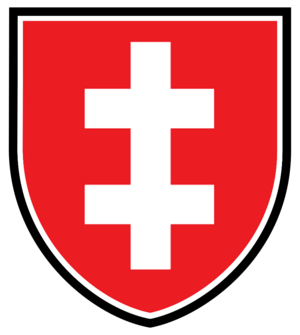Baltican Armed Forces
| Baltican Armed Forces | |
|---|---|
| Baltijos ginkluotosios pajėgos | |
 Insignia of the Baltican Armed Forces | |
| Founded | 1662 |
| Current form | 20 May 2022 |
| Service branches | |
| Headquarters | Ramutia |
| Leadership | |
| Commander-in-Chief | Hornumas Vytis |
| Minister of Defence | Lingunas Bvurngis |
| Chief of Defence | Rukis Murgis |
| Personnel | |
| Military age | 18–65 |
| Conscription | 11 months |
| Available for military service | 1,231,564 males, age 16–55 (2022 est.), 1,402,541 females, age 16–55 (2022 est.) |
| Fit for military service | 759,123 males, age 16–55 (2022 est.), 800,803 females, age 16–55 (2022 est.) |
| Reaching military age annually | (2022 est.) |
| Active personnel | 100,123 |
| Reserve personnel | 302,541 |
| Deployed personnel | 1,123 |
| Expenditure | |
| Budget | €3.4 billion |
| Percent of GDP | 3.8% |
The Baltican Armed Forces are the official military of Baltica. The Amred forces officially consist of the Baltican Navy, the Baltican Land Forces and the Baltican Air Forces. The purpose of the Armed Forces serve as a deterrent to other nations, whilst ensuring the Central Governments control over all Baltican territory. The defense policy of Baltica is to ensure that the populace is ready and trained for war if the need arises, and to slowly develop Balticas military to be able to competently defend against foreign militaries.
Conscription is still in affect in Baltica for all people from the ages of 18 to 65 for a total of 11 months. However, the current chief of the Armed Forces, Juozas Vejas has revealed that conscription will be outlawed at the start of 2023. As of 2022, Balticas military budget was an estimated 3.4 billion, or 3.8% of Balticas total GDP.
History
Royal Army Era
Republic Era
Modern Era
The Baltican Armed Forces were established shortly after the end of the Baltican Civil War. At first, the army was in the control of the Individual Republics of Baltica, although after the formation of the Baltican Central Government the entirety of the Armed Forces were gradually transferred to the Central Government. Under Juozas Vejas, all of the Armed Forces have seen a gradual modernization, especially through the purchase of ships and aircraft from other nations.
Branches
Baltican Land Forces
The core of the Baltican Armed Forces is the Baltican Land Forces, which contributes to most of its fighting ability. The Baltican Land Forces are large and divided between 4 Brigades consisting of a mechanised brigade, two infantry brigades and an artillery brigade. The Nation Defense Volunteer Force is also a part of the Land Forces, contributing to the national defence of important urban and military assets (Most notably the capitals of each of the Republics of Baltica). The Baltican Engineer BatalBattalionslions are also a part of the Land Forces. Altogether, the Land Forces consist of 67 thousand personnel. Ramutia acts as the sole military HQ of the Land Forces, although plans are currently in place to create three further facilities in Southern, Western and Eastern Baltica.
The Baltican Navy has over 8,331 personnel. The Navy consists of the Warship Flotilla, the Sea Coastal Surveillance System, the Explosive Ordnance Disposal (EOD) Divers Team, the Naval Logistic Service, Training Center and Maritime Rescue Coordination Center. The flotilla is the core component of the Navy and consists of the Mine Countermeasures Squadron, the Patrol Ships Squadron, and the Harbour Boats Group. The current Commander in Chief of the Baltican Navy is Head Admiral Yvo Falk. The Naval base and Headquarters are located in Port Svoyev in the Republic of Belgorta.The Navy uses civilian ships for coastal surveillance.
Baltican Air Force
The Baltican Air Force is the smallest part of the Armed Forces, consisting of only 5,343 personnel and five aircraft purchased from Ahrana that are still in delivery.Its current HQ is General Augustinians Air Base in Ramutia, which remains the sole HQ of the Air Force with no current plans for expansion. A full expansion for the Air Force is planned for 2025, after both the Navy and Land Force modernisation schemes.